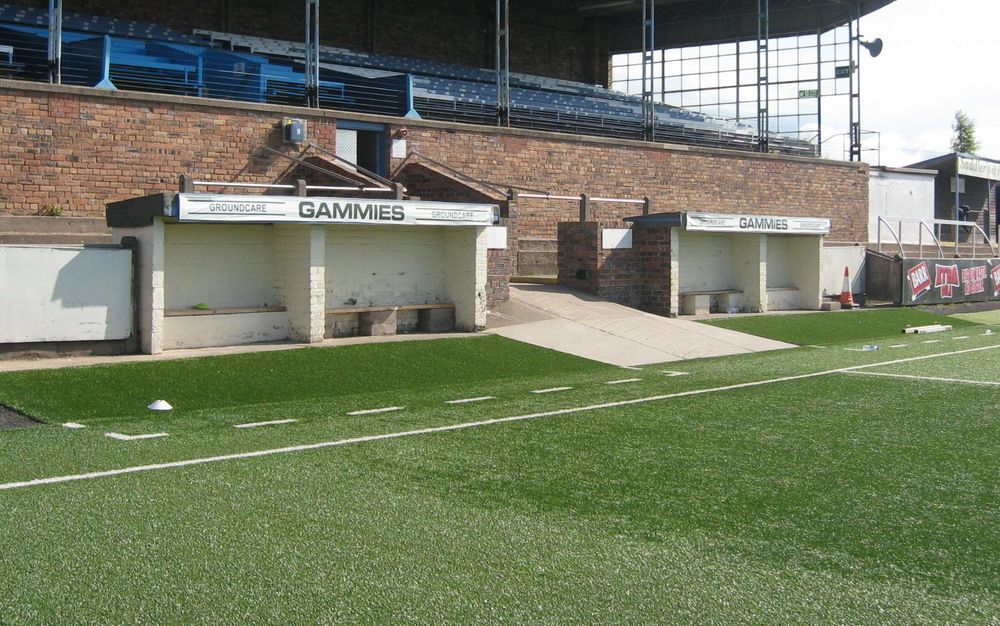
We`ll start Part 10 of this series on there of the managers and one assistant manager who took charge during Ruislip FC`s brief and surprise spell as a Southern League club.
Ruislip had only joined the Premier Division of the Middlesex League in 1981, replacing Ruislip Town who had left in 1980 after finishing last in league for two consecutive seasons.
They finished second-from-bottom of the Premier Division in their first season and ended the 1983/84 season in last place.
The league then became the Middlesex County League but, despite only finishing eleventh in the league's inaugural season, Ruislip moved up to the Southern Division of the Southern League.
Ruislip finished bottom of the Southern Division in 1988/89, after which they left the league and subsequently folded.
Colin Barnes was the first man to take charge of a Southern League game for Ruislip in the Southern League at Breakspear Road – now called the Middlesex Stadium and home to former Southern League and current Spartan South Midlands League outfit, Hillingdon Borough.
Barnes started his playing career with Leyton Orient but was released without managing to break into the first team at Brisbane Road.
He went on to have spells with Wembley, Ruislip Manor, Southall and Uxbridge until he was 25.
Sadly, he suffered an injury which meant he had to stop playing and he immediately took up coaching.
He took over as manager of Ruislip in 1985 and after their surprise elevation to the Southern League, led them to a very respectable eighth-place finish in their first campaign at that level in 1985/86.
The division possessed of the stature of Dover Athletic, Tonbridge, Salisbury and Cambridge City, who finished as champions, while below the `new boys` in the table were the likes of Poole Town, Trowbridge Town, Ashford Town and Dorchester Town, who finished bottom.
Barnes joined neighbours Burnham as a coach initially in 1986 – the club had merged with Hillingdon and took their place in the Southern League.
In February 1987 he took over as manager and in 1999/00, led Burnham to the Fourth Round of the FA Trophy where they drew Scarborough, then residing in the Conference having been relegated from the Football League.
Burnham managed a 1–1 draw at home before losing 6–0 in the replay.
Born in Hayes, Middlesex, Brian Caterer worked as head groundsman.
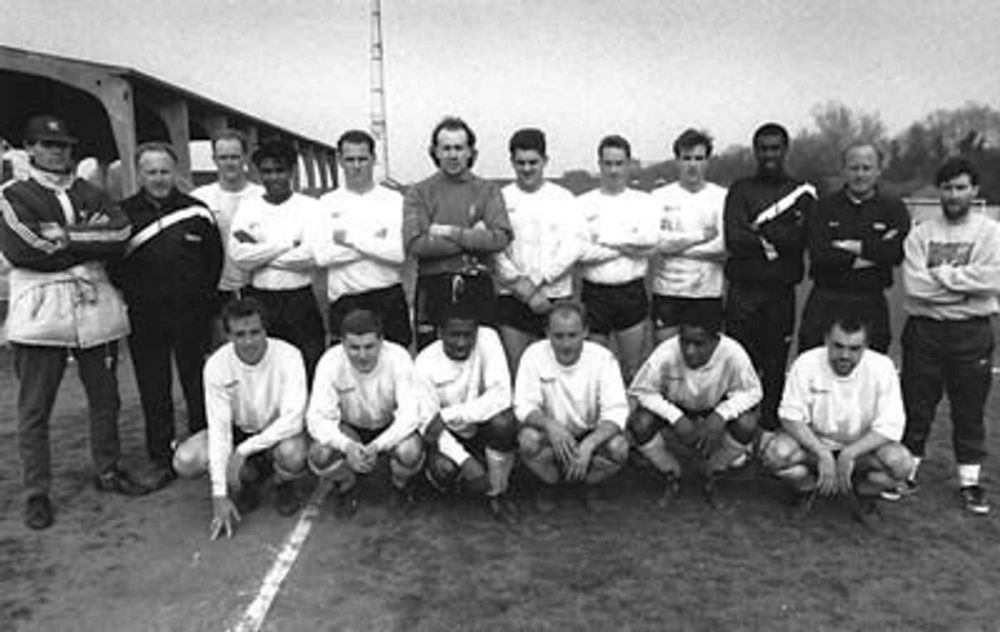
Brian Caterer (wearing cap standing on the far left of the back row)
He began his playing days as a junior at Hayes, making his first-team debut at centre-half in the last match of the 1961/62 season at the age of 19.
He then went to Uxbridge, Chesham United and Southall before re-joining Chesham, for whom he played in the 1968 FA Amateur Cup Final at Wembley which the Generals lost to favourites Leytonstone, who played for 71 minutes with ten-men after one of their players suffered a broken leg.
He returned to Hayes for the 1968/9 season and played the first four matches of the season and then went on holiday, returning for the FA Cup tie with Brentwood.
Finding that he was on the substitutes’ bench, he left and joined Leatherhead.
It was while he was with Leatherhead that he played his one and only game in the Football League for Brentford at Rochdale.
He re-joined Hayes in August 1970 for the third and final time and stayed for a full season, which saw him selected for Middlesex, and was a late replacement for the injured Bobby Hatt for the Middlesex Wanderers in the match to celebrate Uxbridge’s centenary in May 1971.
At the end of the season, he re-joined Southall and then finished off his playing career with Slough Town and Maidenhead United.
In 1981/82 he was manager of Woking where his assistant was Colin Lippiatt - his brother-in-law (see below), and of Leatherhead from October 1982.
Then, after sacking former Republic of Ireland and Chelsea European Cup Winners Cup winner John Dempsey in December 1982, Maidenhead turned to Caterer and Lippiatt.
The pair pulled the Magpies away from relegation danger in their first full season and the following campaign saw a concerted promotion challenge. The club lost just one of their final fourteen matches but that solitary defeat at eventual runners-up Epsom & Ewell proved crucial and the duo never subsequently steered the club to the same heights.
At the end of 1985/86 both men left the club and joined new Southern League club Ruislip.
Caterer was later to return to Maidenhead as assistant to Martyn Spong before having a short second spell with Windsor & Eton in 1992 before being sacked in January 1993.
Colin Lippiatt was born in Hayes, Middlesex in January 1942 and played schools football for Southall Boys and Middlesex Boys before joining the Hayes ‘A’ side, where he played alongside John Sissons, who went on to star for West Ham United.
Lippiatt started out as a wide player but was converted into a centre-half.
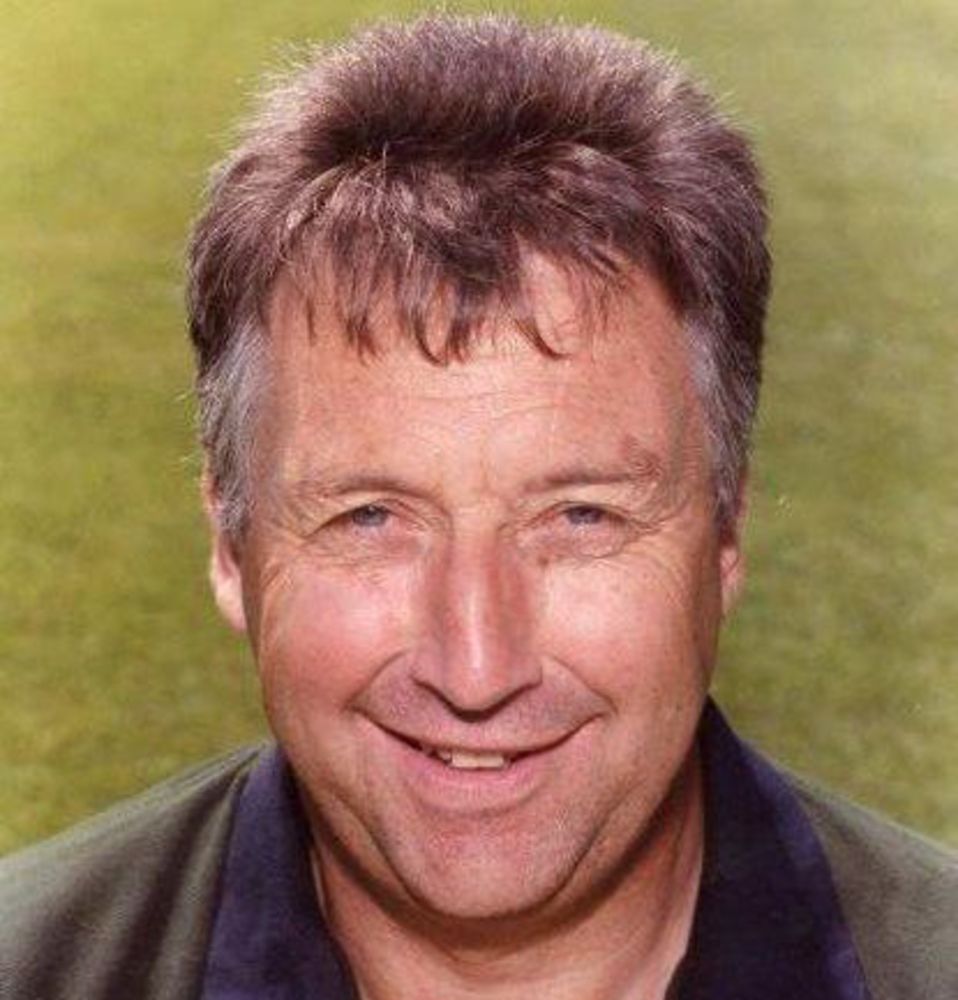
Colin Lippiatt
Along with his future brother-in-law, Brian Caterer, Lippiatt was offered a trial with Brentford, which he didn`t attend as he had a decent job as an apprentice at EMI.
Having spurned the possible opportunity to make a career in the professional game, he went on to play non-League football for Hayes, Ruislip Manor, Uxbridge and Wokingham Town before cartilage problems brought his playing days to a premature end when he was 28.
By then in 1978, Caterer had gone into management at Windsor & Eton and Lippiatt got the invitation to go over and ‘help out’.
In 1981, Lippiatt started his long association with Woking - a club he have great success with.
He didn’t stay long this time round and moved to several other local clubs, including being assistant manager at Leatherhead, Maidenhead United and with Caterer once more at the new Ruislip club in the Southern League South Division.
He returned to Woking in 1987 and spent ten years with Geoff Chapple, getting Woking promoted to the Conference and then finishing runners-up twice and winning the FA Trophy three times.
When Chapple left Woking, Lippiatt also left, but surprised many by heading down to Somerset to join Yeovil Town.
Upon taking the Huish Park hot-seat he had to deal with many players leaving to follow former boss Graham Roberts but brought quality to the club in the shape of future manager Steve Thompson and Kevan Brown.
However, Yeovil were heading towards full-time football and Lippiatt was part-time with a good job in the South-East in a sales role.
He was not prepared to give that up and resigned to return to assist Chapple at Kingstonian before returning to Woking in February 2000.
He helped save the Cards from relegation but when Chapple was sacked by Kingstonian, he re-joined Woking, with Lippiatt reverting to his number two.
In 2004, having taken over the managerial reins at Chesham United, Lippiatt was asked to become assistant to Stuart Cash – father of current Aston Villa star Matty - at St Albans City.
Cash left a week later and Lippiatt found himself in charge and, as he had at Woking, he saved an apparently doomed side from relegation.
Even more remarkably, he went on the following season to lead the club to the promotion to the Conference.
He wanted to call it a day then but was persuaded to stay on for the Saints’ inaugural Conference season. Unfortunately, after a bright start, he was unable to prevent City from going back down.
He could have stayed on at Clarence Park, but he decided that he’d had enough of coaching and managing and wanted to step down.
He eventually returned to Woking in a new role as technical director.
He died in October 2010 with pancreatic cancer, 10 months after brother-in-law Brian Caterer passed away.
George Talbot was born on February 1948, and lived most of his life in Hayes, before moving to Maidenhead.
As a youngster he played for Queen’s Park Rangers before entering the amateur game in West London, playing variously for Hillingdon Borough, Ruislip Manor, Uxbridge, Staines Town and Walton & Hersham.
During his nine seasons at Staines, he made 329 first team appearances and enjoyed promotion four times, earning the accolade from the club as ‘one of the most charismatic players of the last half century’.
Moving into management, Talbot led several of the teams for which he had played, such as Walton & Hersham, Staines and Uxbridge, arriving as a coach in 1990 before stepping up to manager for the 1991 season, a post he held until 2006.
He led Uxbridge to nine cup finals during his 15 years in charge, with a win-loss record of 4/3 in the London Challenge Cup and 1/1 in the Middlesex Senior Cup.
He also managed Addlestone & Weybridge, after being Dave Donaldson`s assistant, Hounslow and Harefield United and was assistant manager to Colin Barnes at Ruislip in their first season as a Southern League club in 1985/86.
While at Walton he signed Peter Osgood, then in the twilight of his playing days after his stellar career at Chelsea, Southampton and Norwich.
Born in Swansea in May 1932, defender Glyn Davies played 200 Football League games for Derby County before joining his home-town club Swansea Town.
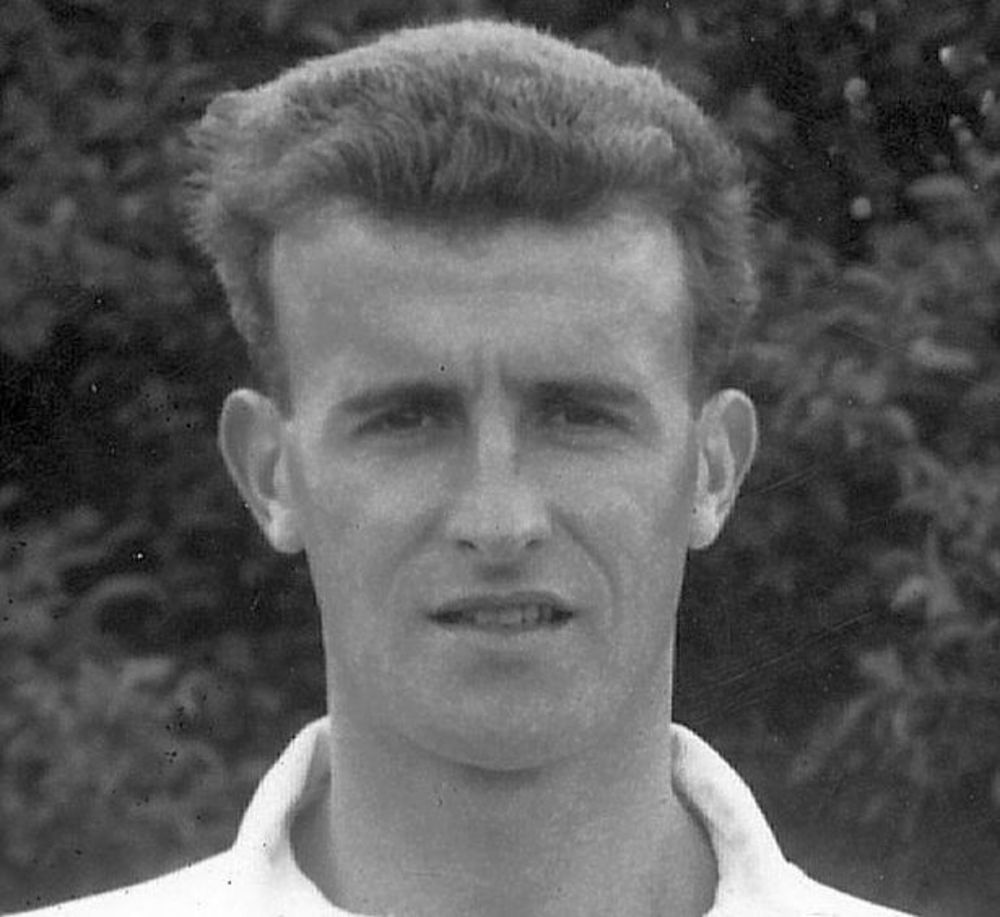
Glyn Davies
He only made 17 appearances in two years before joining Yeovil as player-manager, aged 31, for just under a season and a half.
After leading the team to the Southern League title, he landed the Somerset Professional Cup the following year.
He returned to South Wales for the start of the 1965/66 season as manager of Swansea, Yeovil receiving a compensation payment of £1,250.
When Davies moved to the Vetch Field, he became the first Swansea-born manager to take charge of the team.
With his experience and leadership, it was hoped he could turn the fortunes of the club around.
Sadly, for both the manager and the team, the club was in decline and they finished in a lowly 17th place, although he did win the Welsh Cup and gain entry into Europe.
But when after 13 games of the 1966/67 season the side found themselves rock bottom of the league, the writing was on the wall and Davies’s contract was terminated.
He departed the Vetch Field in October 1966 and became Welsh League side Pembroke Borough's player-coach and was later with then-Cheshire League outfit Oswestry Town.
He died in February 2013 in Swansea, aged 80.
Going well back in time, Scotsman Bill Collier, from Kirkcaldy, Scotland, began his career with Raith Rovers.
However, having fought in the First World War, Collier was 29 before he could really start his professional career in earnest.
Capped just the once for Scotland at full international level against Wales in February 1922, he moved south of the border to join Second Division Sheffield Wednesday in 1924.
After just one season at Hillsborough, Collier, now 34, took over as player-manager of Southern League Eastern Section club Kettering Town.
He used his contacts to bring a number of players down from Scotland, many given `job`s at the Steelworks at nearby Corby.
The policy worked as the Poppies finished fourth in Collier`s first two seasons in charge, led them to an FA Cup Second Round tie against Grimsby Town which was lost 3-1 in the replay at Cleethorpes after a 1-1 draw at Rockingham Road.
Then in 1927/28, Collier led Kettering to the Southern League Eastern Section championship for the first time.
And they added to that by becoming the overall champions of the Southern League after beating Western Section winners Bristol City reserves 5-0 in play-off.
The following season saw the Poppies retain the Southern Eastern Section title, but lost play-off with Western Section winners Plymouth Argyle reserves 4-2 at Rockingham Road.
The 28/29 season was also pivotal for Collier and Kettering as, after losing bravely 2-0 at Selhurst Park against Third Division South side Crystal Palace, the Londoners` manager at the time, Fred Mavin, singed no fewer than five of the Poppies players.
Shed of goalkeeper James Imrie, centre-half George Barrie, outside right George Charlesworth, inside left Andrew Dunsire and centre-forward Peter Simpson, Collier left with a massive hole to fill.
Scotsman Simpson, who scored an amazing 100 goals in just 60 appearances for the Poppies, went on to become a `legend` at Palace.
In his first five seasons at Selhurst Park, he topped the goalscoring charts every time, another unbeaten record.
He was eventually transferred to West Ham United in the summer of 1935, having scored 166 goals from 196 appearances for Palace, scoring 19 hat-tricks in four years.
His goals and hat-trick totals for Palace are records that are still unbeaten.
A combination of the loss of half of his successful team and the club dropping out of the Southern League to join the Midland League saw Collier leave Rockingham Road.
But his personal success continued as he joined former league rivals Dartford in 1930.
The Scotsman continued his pattern of success and won the Southern League Eastern Section title in 1930/31 and 1931/32 (missing a hat-trick by just one point the season after) and the overall championship of the league was won with victories over the Western Section winners Exeter City reserves 7-2 away and Yeovil & Petters United 2-1 at home respectively.
Dartford also won the Kent Senior Cup four times in five seasons and the Kent Senior Shield three times during Collier`s tenure.
In addition. Dartford gained a reputation nationally by becoming the first club outside the Football League to reach the FA Cup Third Round in successive seasons.
In 1935/36 Dartford lost to a Derby County - then second in the First Division - 3-2 at the Baseball Ground having at one time led by 2-0 - leading player Fred Dell was transferred to West Ham United for a reported £2,000 immediately after the game.
The following season saw Dartford lose 1-0 at home to Darlington at the same stage.
In 1938/39, Dartford finished bottom of the Southern League table and were relegated – Collier`s first set-back as a manager.
They continued to struggle and towards the end of the 1930s Collier resigned to take over a business in Scotland.
Several decades later, a second Collier stepped into management.
But before that, Mark Collier played for Purton and Chippenham Town and was a prolific goalscorer for Swindon Athletic before they amalgamated with Supermarine in 1992.
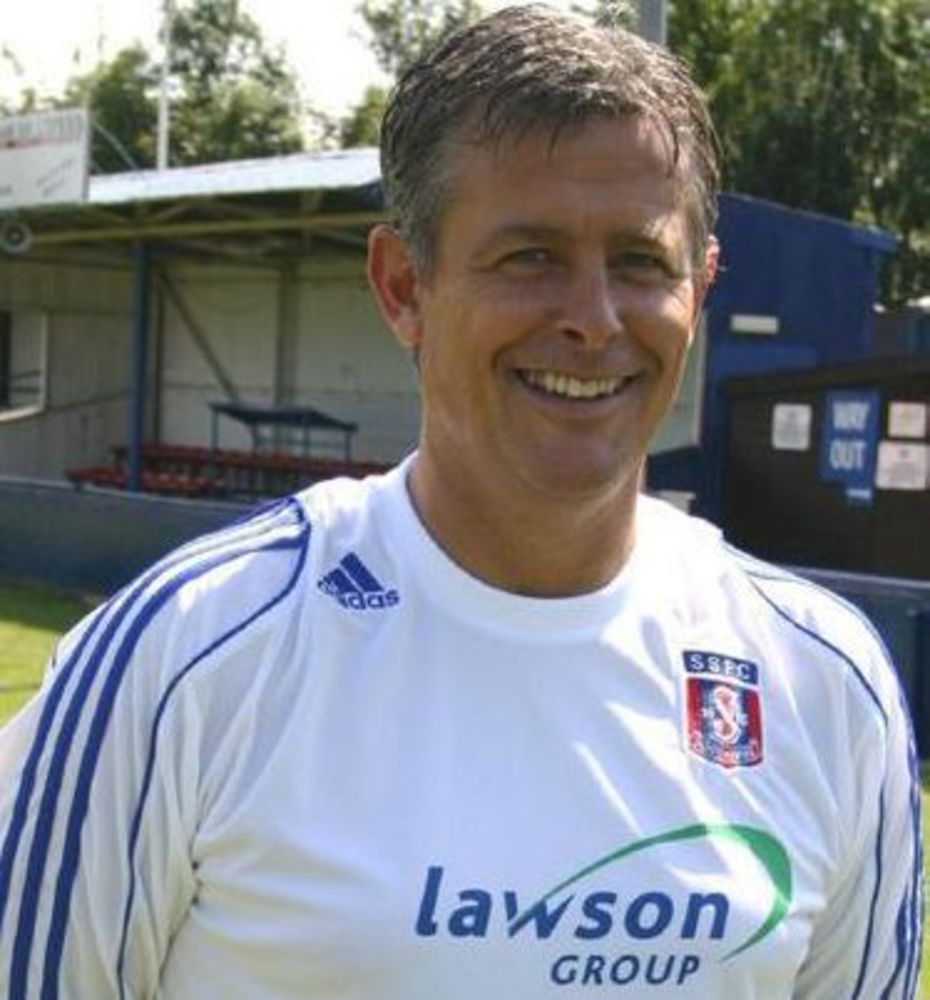
Mark Collier
In January 2004 he took his first step into senior management when he was appointed assistant manager to Tommy Saunders at Swindon Supermarine, but this only lasted eight games and he was given the opportunity to manage the side after Saunders resigned.
At the time the side were in a precarious position as they fought for their Southern League survival.
The threat of relegation wasn't lifted until the final two games of the seasons and the rest is history as within two seasons Collier and his assistant, Ian Howell, led the team to promotion to the Southern Premier Division.
Collier’s inaugural season finished on a high in the 2005 season with 1-0 wins over promoted Ashford Town and a strong Swindon Town side in the Wiltshire Premier Shield at the County Ground.
Prior to the promotion season in 2007, the team made the play-offs in the previous 2005/06 season with a fifth-place finish in the league but lost 3-0 against a very strong Hemel Hempstead Town side who were eventually promoted.
The following season, Collier brought the biggest success to `Marine in its history when the side battled its way to the league play-offs and successfully defeated Burnham and Taunton Town to gain a place in the Southern League Premier Division for the 2007/08 season.
The management team disappointed a number of the pundits in that inaugural season as they kicked-off as relegation favourites but completed the season with the team finishing in a very creditable 12th place.
This was equalled again the following season and `Marine also had an excellent FA Trophy run with the team reaching the last 16 of the competition.
On the way the side defeated two Conference sides and only lost a close game 2-0 to then holders Ebbsfleet United watched by over 3,700 spectators.
In February 2011, Collier resigned due to proposed budget cuts and after a spell coaching at Swindon Town`s academy, he took over as manager of Chippenham Town in November 2013 and led them to the National League South as Southern League Premier Division champions in 2016/17 and kept them at Step 2, finishing 13th in his first two seasons in charge.
In January 2020 though he was dismissed.
Keith Scott was a late entrant to professional football, playing only Sunday league football in Leicester until the age of 19.
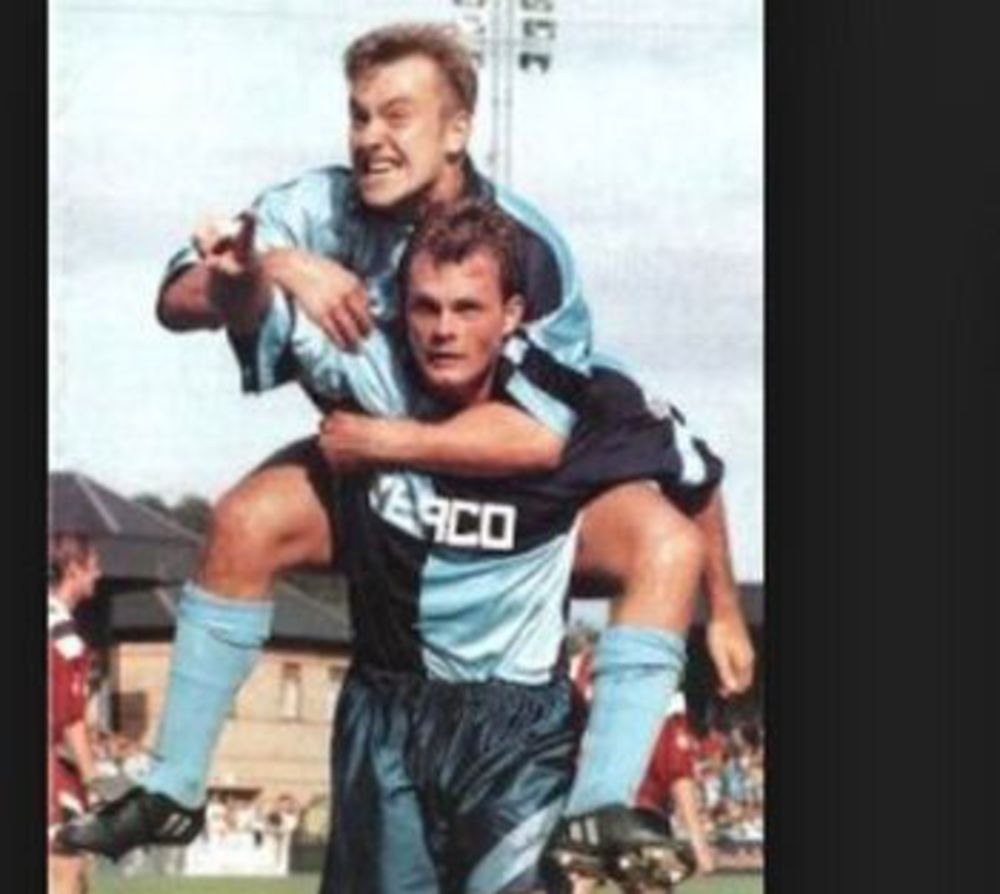
Keith Scott
He then joined Hinckley Athletic before moving into the Southern league with Bedworth United.
After returning to Hinckley, he joined Leicester United at the age of 22.
This won him the attention of Lincoln City, but a poor year (16 games, 2 goals) saw him drift back into non-League football with Martin O'Neill's Wycombe Wanderers.
His goals were a major contribution to Wycombe's Conference championship and resultant promotion into the Football League.
He joined Swindon Town for £300,000 and made 51 Premier League and Division One appearances scoring 12 goals.
Joining Stoke City, he made 25 appearances for the Staffordshire side scoring 3 goals before moving to Norwich City in November 1995 in a swap deal involving Mike Sheron.
He started his Norwich career with 2 goals in 2 games but lost favour after Martin O'Neill's departure.
He spent a month on loan to Bournemouth later that same season and at Watford before re-joining former club Wycombe on loan in March 1997.
Nine games for the Wanderers generated 3 goals and convinced manager John Gregory to pay £55,000 for his services on a permanent basis in July 1997.
He left Wycombe to join Reading in March 1999 for an undisclosed fee, although reports suggested it was £50,000.
He joined Colchester United on loan in mid-October 2000 but after starting well, his progress was hampered by a serious knee injury. When he did recover in February 2001, Colchester were keen to sign him, but the two sides were unable to agree personal terms.
Colchester decided not to sign him on a permanent deal and so he spent the summer of 2001 looking for a new club.
Despite interest from Telford United, he eventually signed for Conference side Dover Athletic in the week preceding the kick-off of the new season.
In July 2002, the Scarborough signed Scott for the Seadogs assault on the Conference.
But Scarborough's financial perils almost certainly played a part in Scott's transfer to rivals Leigh RMI in February 2003.
Leigh manager Mark Patterson had been assistant manager at Scarborough and so knew Scott's potential.
Five months later and Scott made a shock move to Conference big guns Dagenham & Redbridge in July 2003 where he formed a new striking partnership with Alex Meechan. However, he was loaned out to Tamworth within days of arriving at Dagenham as the Daggers did not need him at the time.
In early September, Scott was recalled from his loan at Tamworth to be released by Dagenham so he could sign for Isthmian Leaguers Windsor & Eton, for whom he made his debut in September 2003.
The 2004/5 season saw him make only a handful of starts for Windsor and it was therefore no surprise when the Royalists let him go in early June 2005.
By the end of the month, he had signed for then-Southern League side Northwood as player-coach.
After a spell coaching for Chesham United, Scott was appointed manager of Southern Division One Midlands club Leighton Town in mid-October 2006.
A shortage of players forced Scott to take to field against Dunstable Town in January 2007 in the unusual position of goalkeeper - a position he had never previously occupied.
Scott met with success at Leighton. They were 11 points from safety at the bottom of the Division One Midlands table when he was appointed but he led them to safety and also to victory in the Buckingham Senior Charity Cup final in May 2007.
In the 2007/08 season, he steered the club to their most successful campaign in the FA Cup, reaching the Fourth Qualifying Round where they were defeated by Havant & Waterlooville.
In December 2007, Scott resigned his post at Bell Close to take up the managerial reigns at former club Windsor & Eton.
Despite winning the Southern League South & West Division title in 2009/10, Scott was sacked in May 2010 and replaced by David Mudge.
In June 2011, Scott and Jim Melvin were named as the new bosses of the new Windsor FC club after financial irregularities had eventually seen the old club go into administration, with Windsor FC being formed in its place and taking a spot in the Combined Counties League.
But Scott resigned as manager in September 2012 after the withdrawal of the playing budget.
Bill Shipwright was a strong centre-back who was on Watford`s groundstaff between March 1950 and April 1951.
He also turned out for then-Corinthian League side Chesham United before being called up for National Service.
He served in the RAF and skippered their football team in Egypt.
After being demobbed he spent six years as a professional with Watford, making over 150 appearances.
In June 1959 he was transferred to Aldershot in a player exchange deal involving right back John Price going to Vicarage Road.
Ironically, Shipwright and Price had been team-mates in youth football in North London!
After making further 100-plus appearances for the Shots, he signed for Southern League Division One side Yiewsley in the summer of 1963 and spent two seasons with the club which became Hillingdon Borough in his second term.
In 1965, he took over as manager of Athenian League side Wokingham Town and after a break from the game, returned to take charge of former club Hillingdon, who were now in the Southern Premier Division.
But he took charge in February 1973 at a time when they were struggling, and although they finished 15th in his first season, they were bottom-of-the-table in 73/74 and went down to the Division One South.
Shipwright set up his own business with his wife Betty, `Golden West Sports`, in Iver, Buckinghamshire and still runs it – organising tournaments and trips for young players.
I count myself as being fortunate to get to know Bill through mainly his `Arsenal International` tournaments over the years and a nicer, kinder and knowledgeable man you couldn`t wish to meet.
John Roles began his career as an apprentice at Portsmouth before moving along the coast to Southampton.
He failed to make the breakthrough into the senior side and signed for Isthmian League side Sutton United in November 1983.
The following summer he switched to league rivals Bromley where he spent five years before moving to Conference side Fisher Athletic.
The Fish were being managed by Malcolm Allison at the time and attracted enormous national attention.
When Allison clearly felt out of place at that level, he quit in November 1989 and was replaced by former Wolverhampton Wanderers and England midfielder Mike Bailey.
Roles left the Dockers in September 1990 and signed for Southern League Margate.
A brief spell with another Southern League outfit, Crawley Town, followed before he returned to the Isthmian League with Croydon in February 1991.
After quitting playing, Roles took up coaching and managed Southern League Eastern Division club Sittingbourne`s reserve side before stepping up into the first team role when Hughie Stimson left at the beginning of January 2001.
However, he was sacked in September 2001 but did stay on as a player for a short time.
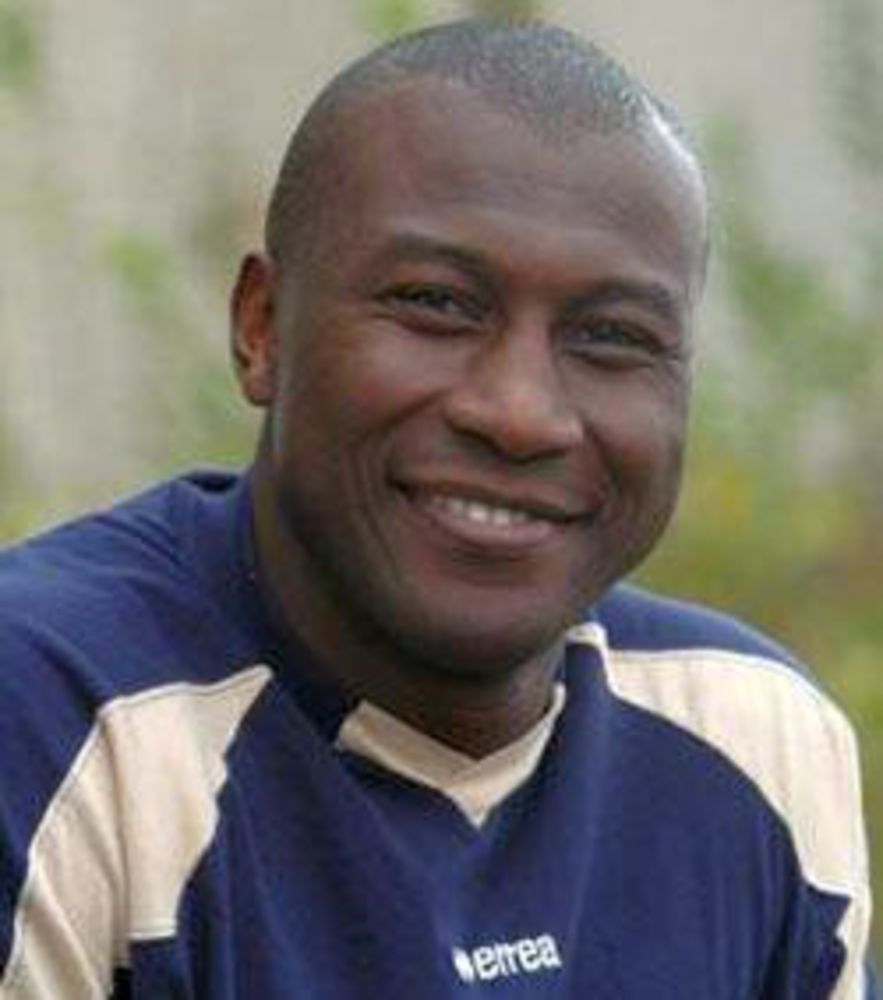
Adie Mings
Tyrone Mings has gone from playing non-League football to being a top Premier League defender and an England international.
His dad Adie Mings wasn`t a bad player either.
Although never reaching the dizzy heights of his son, Adie, nevertheless, carved out a long and successful time as a non-League striker.
Indeed, Mings spent his entire 25-year career in non-League football.
Born in Chippenham, he started his career with Melksham Town in the Western League before signing for Chippenham Town.
He went on to play for Bath City, Gloucester City, Forest Green Rovers, Basingstoke Town, Chippenham again and Weston-super-Mare.
He returned to his home-town club as player-coach and then player/assistant manager before being appointed full-time manager in January 2007.
Mings twice lead the club to the Southern Premier play-offs but was replaced by Nathan Rudge in April 2012 after a disappointing run of results.
He was moved into a backroom role as director of football at Hardenhuish Park and then in September 2012, Mings left that role to take up a scouting job at Premier League giants Chelsea as youth scout in the South West.
Rod Brown played professionally in the Scottish League for Dundee United, Brechin City and Arbroath - clocking up more than 150 appearances.
He ventured south of the border in the late 1980s and played for Gloucester City and Forest Green Rovers until injury prematurely ended his playing career in 1991.
He began his managerial career at Halesowen Harriers in 1994, and in the subsequent years has achieved consistent levels of success at his clubs - including five promotions.
He led Stourport Swifts into the Southern League in 2000, and then Redditch United into the Conference structure four years later.
He took Bromsgrove Rovers up into the Southern League Premier Division at the end of 2006/07 but left the Victoria Ground in November 2007.
And was appointed as Rugby Town's first team manager in January 2008 after Billy Jeffrey's resignation.
After a poor start to the season which saw a return of just two points from the opening six games, Brown moved back to former club Bromsgrove.
But in May 2009, Brown surprised many by quitting Rovers again to drop a league to join then-Midland Alliance outfit Stratford Town.
In 2012, Brown re-joined Midland League side Stourport Swifts and spent three years back at Walshes Meadow.
In March 2015, he was appointed as vice-chairman of National League North outfit Kidderminster Harriers, managed then by Brown`s former number two at Stourport in his first spell, Gary Whild.
Then, in February 2020, Brown moved to Southern Division One Central club Halesowen Town as vice-chairman.
Dave Donaldson was part of the successful Walton & Hersham side that won the 1973 FA Amateur Cup and dumped Brian Clough's Brighton team out of the FA Cup the following year.
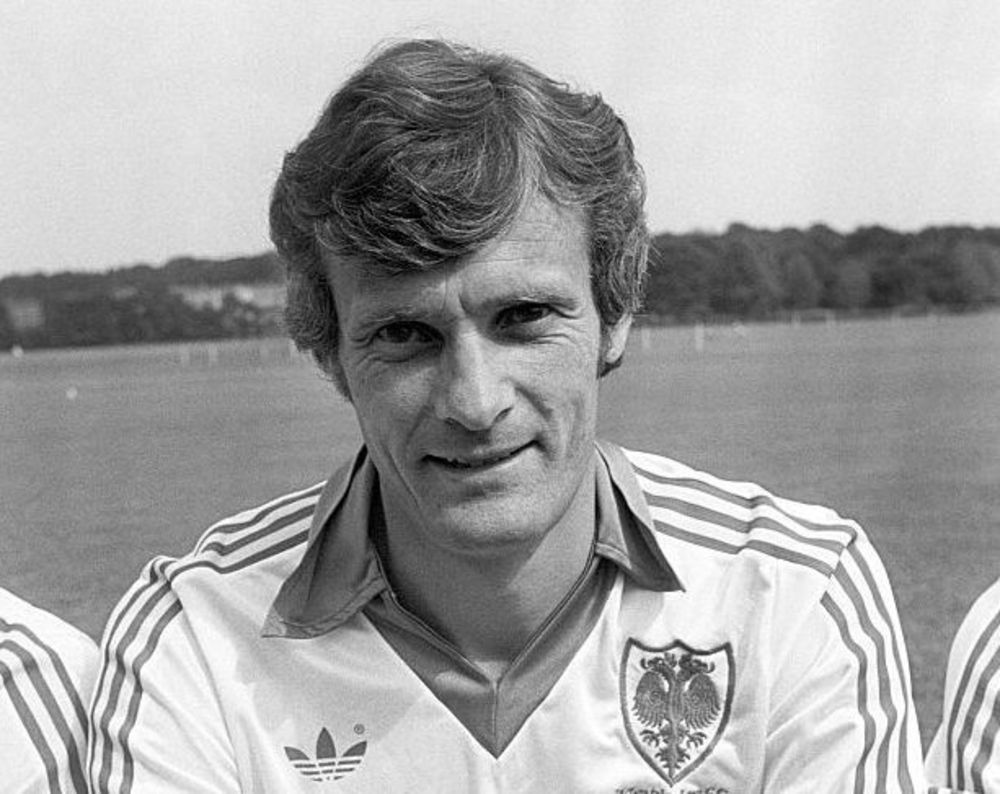
Dave Donaldson
He had been capped by England at amateur level before he joined the Dons in the summer of 1974.
The stylish centre-back formed a brilliant partnership with the more rugged Bryant at the heart of what became the meanest defence in non-League football.
After missing just 6 league games during those title-winning years he became the oldest man ever to make his Football League debut when he captained the Dons in their match against Halifax aged 35.
Voted the club's player of the year that season he was instrumental in helping the Dons gain promotion from the Fourth Division the next year although by now age was finally catching up with him.
Unwilling to jeopardise his successful job at British Airways he stayed part-time and played his last game for the club at Hereford United in May 1979.
Ahead of the 1980/81 campaign, Donaldson took over as player-manager of Southern League South Division club Addlestone, with George Talbot (see above) as his assistant and a change of name to Addlestone & Weybridge Town later that year brought some improvements on the field.
Donaldson brought in some decent players, such as ex-Chelsea striker Steve Finnieston and players who would go on to feature for Talbot for many years at the likes of Uxbridge, such as Danny Pipe, Micky Noad, Mark Woods and John Cassidy.
In 1982/82, Addlestone finished 9th and therefore qualified to enter the newly formed Southern Premier Division.
But they found themselves a bit out of their depth amongst clubs like Kidderminster Harriers, Chelmsford City, Welling United and Gloucester City and finished bottom and relegated alongside Poole Town and Waterlooville.
They finished fifth in the Southern Division the season after, but the sale of their Liberty Lane ground led to a mid-season crisis within the club and the decision was taken to fold after the 1984/85 season, despite finishing a creditable eighth.
Donaldson was still playing in the Southern League at the age of 41 for Hounslow!

Most clubs are looking for volunteers. Find out more on the button below:
www.PitchingInVolunteers.co.ukAll the news and results in one place.
REGISTER